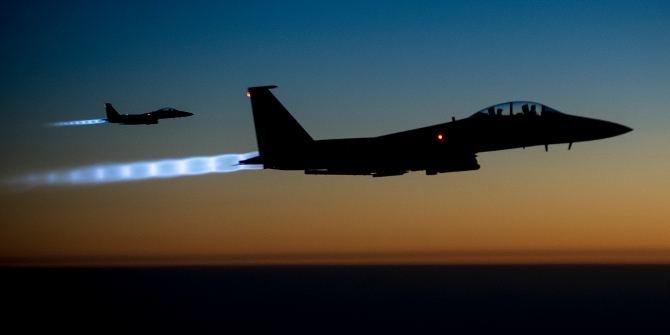 Last week, the U.S. expanded its bombing campaign against the forces of the Islamic State to targets in Syria. Kristian Coates Ulrichsen writes that there are questions over the legality of the actions, which have been justified under the 2001 authorisation made in the wake of 9/11, and over its effects on the regime of Bashar al-Assad in Syria, which is also fighting Islamic State forces. He writes that for U.S. allies in the Gulf such as Bahrain and Saudi Arabia, participating in the U.S. led coalition offers them an opportunity to rehabilitate their international reputations which was damaged during the Arab Spring.
Last week, the U.S. expanded its bombing campaign against the forces of the Islamic State to targets in Syria. Kristian Coates Ulrichsen writes that there are questions over the legality of the actions, which have been justified under the 2001 authorisation made in the wake of 9/11, and over its effects on the regime of Bashar al-Assad in Syria, which is also fighting Islamic State forces. He writes that for U.S. allies in the Gulf such as Bahrain and Saudi Arabia, participating in the U.S. led coalition offers them an opportunity to rehabilitate their international reputations which was damaged during the Arab Spring.
The launching of US airstrikes against Islamic State (IS) and other terrorist targets in Syria last week raises more questions than answers. Chief among them are the legal basis for expanding the military campaign against IS into Syria and the exact nature of the threat posed to US interests by the so-called Khorasan group. Moreover, with Congressional mid-term elections looming and potential presidential candidates gearing up for nomination campaigns in both parties, American politics is in a state of flux with little sign of clarity over a set of policies that the Obama administration looks set to bequeath its successor. The outcome, ironically, may be that the next president inherits a drawn-out conflict in the heart of the Middle East just as President Obama did when he took office in January 2009 having campaigned so vigorously on a platform of bringing the Bush administration’s war in Iraq to an orderly end.
US strikes on Syria began on September 23 with participation from five Arab partners – Bahrain, Jordan, Qatar, Saudi Arabia, and the United Arab Emirates – in the ‘coalition’ formed by Secretary of State John Kerry in Jeddah on September 11. The Jeddah Communique announced a ‘shared commitment’ among US and regional Arab allies ‘to stand united against the threat posed by all terrorism, including the so-called Islamic State in Iraq and the Levant, to the region and the world.’ Twelve days later, these words were put into practice as Saudi Arabia, the UAE, and Bahrain participated militarily in air strikes on IS strongholds in Raqqa and eastern Syria while Qatar provided support aircraft. Two signatories of the Jeddah communique – Egypt and Lebanon – did not take part while Turkey was conspicuous by its absence from the latest regional efforts to contain the IS threat.

The campaign of air strikes in Iraq began in August in response to an unfolding humanitarian catastrophe and later were facilitated by a request for self-defence from the newly-formed Iraqi government of Prime Minister Haider al-Abadi. US Ambassador to the United Nations Samantha Power invoked Iraq’s right to self-defence from the IS threat emanating from across the border as part of the reason for taking action to end the safe havens enjoyed by IS in Syria. US officials argued also that the domestic weakness of the Assad regime gave them the legal right to pursue IS within Syria. However, the reluctance of the White House to seek a fresh authorisation of force from Congress has meant that the legal justification for the strikes has rested on a highly dubious interpretation of an authorisation to take action against Al-Qaeda passed after the 9/11 attacks in 2001. At first glance this is problematic because IS not only has been disowned by Al-Qaeda but has spent the past year fighting Al-Qaeda’s Syrian affiliate, Jabhat al-Nusra, in bloody battles for local control of the Syria-Iraq border.
In this regard, the inclusion of the Khorasan group in the initial list of targets for the US led air-strikes in Syria becomes important. Apparently an al-Qaeda affiliate based in Syria and in the final stages of planning an attack against Western targets and possibly the US homeland, the origin (and name) of the group has puzzled both Islamist and Western observers alike, who have been unaware of any such group operating among the panoply of entities engaged in Syria’s multiple, overlapping conflicts. Rather, it is more likely that the ‘Khorasan’ fighters targeted belonged actually to Jabhat al-Nusra, which has reported losing dozens of fighters in the air-strikes and vowed to retaliate against participating countries. Yet, the specification of an imminent, if obscure and ill-defined, direct threat to the US from an Al-Qaeda-linked group, whatever its precise name, is significant as it places the Syria strikes much more squarely within the 2001 authorisation of force than any action against IS.
More than simply a part of the ‘fog of war,’ the lack of precision over the means, objectives, or even the targets of US and Arab air-strikes in Syria reflects the complicated battle-space in which there is no clear-cut distinction between friend and foe. After having stripped the Assad regime of its international legitimacy, neither the US nor its Arab allies will want to see Damascus benefit from the campaign against radical Islamist groups in eastern Syria. However, it is far from clear that ‘moderate’ elements of the Syrian opposition, such as the Free Syrian Army, possess the unit, resources, or capability to take full advantage of any vacuum in local authority that opens up. Uncertainty over what to do in Syria, both at a strategic and a tactical level, has confined France and Britain to military operations in Iraq, where they are at least working with a recognised government to combat extremist groups within its sovereign territory.
By contrast, it is America’s Gulf allies that have most to gain from their partnership with the US in Syria enables bilateral relations to focus once again on common regional security and counter-terrorism policy. For Bahrain, especially, the opportunity to work alongside the US in fighting extremism is a form of international rehabilitation for a regime whose image suffered considerable international damage during the Arab Spring. Saudi Arabia and the UAE showed themselves to be closely attuned to the public relations benefits arising from the high-profile participation in military operations by (respectively) a son of the Crown Prince and a female pilot. The Gulf States, at least in the eyes of senior officials in Washington, DC and other capitals, are no longer the counter-revolutionary supporters of a reactionary status quo but critical allies in the new war on terror rapidly taking shape.
Please read our comments policy before commenting
Note: This article gives the views of the author, and not the position of USApp– American Politics and Policy, nor of the London School of Economics.
Shortened URL for this post: http://bit.ly/Zkjqnr
______________________
 Kristian Coates Ulrichsen – Rice University
Kristian Coates Ulrichsen – Rice University
Kristian Coates Ulrichsen is a Research Fellow at Rice University’s Baker Institute for Public Policy, an Associate Fellow at Chatham House, and a Visiting Fellow at the LSE Middle East Centre. He is also an Affiliate Faculty at the Henry M. Jackson School of International Studies at the University of Washington-Seattle. His research focuses on the political economy and regional security dynamics of the Gulf and Arabian Peninsula.







1 Comments